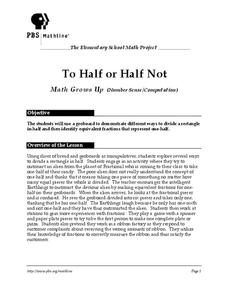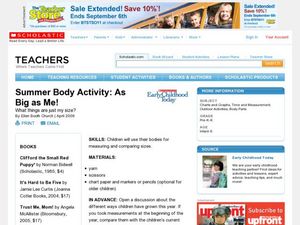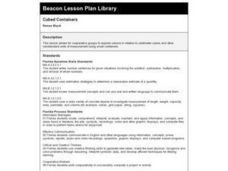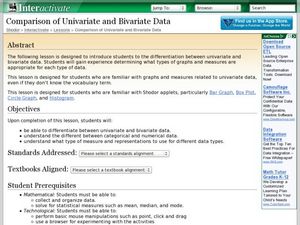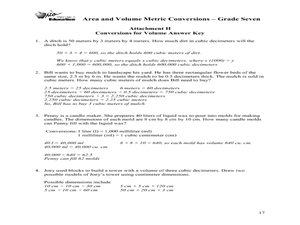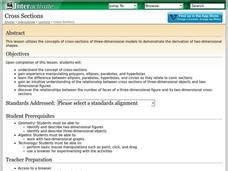Curated OER
City, County, Community
Students explore issues and situations that make for a city and its local environments. In this local government activity, students design maps, define issues and create brochures that illustrate their understandings of these concepts...
Curated OER
To Half or Half Not
Jump into equivalent fractions using these fun scenarios for mathematicians to solve. First, they use geoboards to find different ways to divide a rectangle in half. Then, an alien from the planet Fractional is after one half of their...
EngageNY
The Mean Absolute Deviation (MAD)
Is there a way to measure variability? The ninth resource in a series of 22 introduces mean absolute deviation, a measure of variability. Pupils learn how to determine the measure based upon its name, then they use the mean absolute...
Curated OER
Jack and The Beanstalk Estimation
Introduce the day's lesson by reading Jack and The Beanstalk by Richard Walker, and then review the concept of area with your class. We don't always need rulers to measure, though! Teach learners how to use their hands to help us measure...
Mathematics TEKS Toolkit
Am I Related to Myself?
Elementary or middle schoolers use ratios to discover some nearly constant relationships between measurements of parts of the human body. They find and record pairs of measurements and determine the relationship between the pairs. Pupils...
Curated OER
Summer Body Activity: As Big as Me!
Learners explore things that are their size, literally. In this early childhood lesson plan, students use their bodies for measuring and comparing sizes as they work in pairs to complete the activity.
West Contra Costa Unified School District
Congruent and Similar Polygons
What's similar about congruent and similar polygons? Young mathematicians first measure the side lengths and angles of given figures. They use these measurements to determine relationships between side lengths and angles of congruent and...
Curated OER
Metric Magic
Sixth and seventh graders construct a "metric machine" as a kinesthetic aide in converting from one unit to another in grams, liters, or meters. They complete a metric activity on the Internet and view about five minutes of a video on...
Creative Educator
Dream Room Design
Junior designers brainstorm the elements that a bedroom might have, such as a bed, television, and dresser. They identify which items are needs and which are desires. They practice measurement skills in the classroom by determining its...
EngageNY
How Do Dilations Map Angles?
The key to understanding is making connections. Scholars explore angle dilations using properties of parallel lines. At completion, pupils prove that angles of a dilation preserve their original measure.
Virginia Department of Education
Surface Area of a Rectangular Prism
Wrap up a lesson on surface area with a resource that asks scholars to use the idea of wrapping paper to investigate surface area. They draw representations of rectangular prisms on graph paper to find the areas of the respective...
Curated OER
Cubed Containers
Learners explore volume in relation to centimeter cubes and other nonstandard units of measurement using small containers. They will use hands-on materials to practice this concept. You will need small objects and containers to set this up.
Shodor Education Foundation
An Introduction To Quadrilaterals
Young geometers investigate and apply properties of quadrilaterals. After a review and discussion of key terms, students use a computer applet to explore four-sided figures and classify them according to their attributes. The...
EngageNY
Law of Cosines
Build upon the Pythagorean Theorem with the Law of Cosines. The 10th part of a 16-part series introduces the Law of Cosines. Class members use the the geometric representation of the Pythagorean Theorem to develop a proof of the Law of...
Curated OER
Comparison of Univariate and Bivariate Data
Learners explore the concept of univariate and bivariate data. In this univaritate and bivariate data lesson, pupils discuss the differences between univariate and bivariate data. They work sample problems where they must construct box...
Curated OER
Area and Volume Metric Conversions - Grade Seven
Students investigate unit conversion. For this unit conversion lesson, students will build models of square and cubic centimeters using grid paper and generate formula tables for converting units of area and volume. The tables will be...
Institute of Electrical and Electronics Engineers
Spring Scale Engineering
After examining how a spring scale works, teams work together to design their own general measurement device. Reading material provides background information, but there is no part of the procedure in which learners handle an actual...
Curated OER
Exploring Geometry on the Sphere
In this geometry worksheet, students define important vocabulary dealing with circles. They measure cricles to the nearest degree. There are 11 word problems to be solved.
Shodor Education Foundation
Pythagorean Theorem
Most adults remember learning about the Pythagorean theorem, but they don't all remember how to use it. The emphasis here is on developing an intuitive understanding of how and when to use the theorem. Young mathematicians explore...
Curated OER
The Golden Students
Scholars view the video, "Donald Duck in Mathmagic Land," and discuss examples in nature which have proportions of the golden ratio. They measure and record different body lengths from a worksheet and convert the ratios to equivalent...
Curated OER
1, 2, 3 o' Clock Rock
Second graders identify the hour and minute hands. They tell time by the hour, nearest quarter hour, half hour, and determine the relationships of time (e.g. minutes in hour, days in a month, weeks in a year). They create over-sized...
Curated OER
Planning a Garden Using a Grid
Third graders plan for a garden. In this garden planning lesson, 3rd graders investigate the use of a grid to accurately map out and plan for a vegetable garden. Students predict the space requirements for different vegetables.
Shodor Education Foundation
Cross Sections
Use this activity on cross-sections of three-dimensional shapes in your math class to work on algebra or geometry Common Core standards. The instructional activity includes a list of relevent terminology, and a step-by-step process to...
Space Awareness
Britannia Rule the Waves
Could you determine longitude based on measuring time? Early explorers used a longitude clock to do just that. Scholars learn about early exploration and the importance of the invention of the clock. Then pupils build their own longitude...



